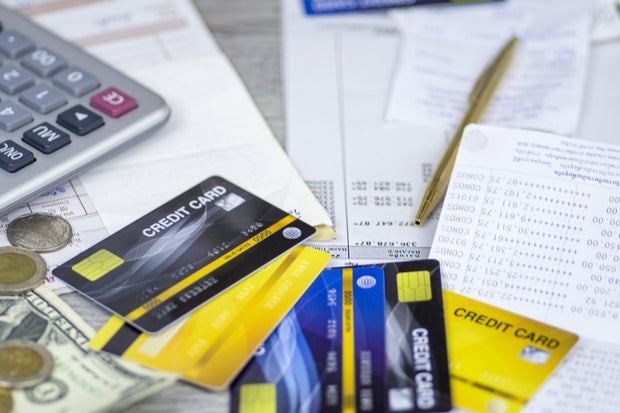How serious is a credit card charge-off? Here’s what borrowers should know.

Athima Tongloom/Getty Images
When you’re struggling to keep up with your growing credit card bills, it can feel like you’re just one missed payment away from losing control. And in many cases, that’s not far from the truth. After all, today’s credit card rates have surpassed 22% on average, meaning that those carrying a balance are likely paying a lot in interest to do so, and the average cardholder owes close to $7,000 right now. As a result, many people’s budgets are stretched thin by their high and increasing credit card payments, and the current inflationary environment is only adding to the issue, which has led to an uptick in late payments and serious delinquencies.
Once an account becomes seriously delinquent, typically after six months of missed payments, your lender may charge off your debt, signaling that they don’t expect you to pay it back. But a charge-off doesn’t mean your debt disappears. In fact, having a charge-off reflected on your credit report can make your financial situation worse, especially in the short term. It can trigger a wide range of consequences, from collection calls to opening the door to legal action. And, it’s also one of the most damaging marks that can appear on your credit, one that can linger for years.
Just how serious is a credit card charge-off, though, and what should borrowers know about this type of debt? That’s what we’ll examine below.
Find out what steps you can take to get rid of your charged-off debt now.
How serious is a credit card charge-off?
A charge-off occurs when a credit card issuer writes off your account as a loss, typically after 180 days (or six consecutive months) of nonpayment. That doesn’t mean the debt is forgiven. It just means the lender has moved it off its books for accounting purposes. The debt still legally exists, and you’re still responsible for paying it.
The immediate impact of a charge-off on your credit score can be devastating. A charge-off typically causes your credit score to drop substantially, depending on your starting score and overall credit profile. This mark remains on your credit report for seven years from the date of your first delinquency. During that time, you’ll likely face higher interest rates on any new credit you can obtain, difficulty getting approved for mortgages or auto loans, challenges renting apartments and potentially even problems with employment.
Beyond credit score damage, there are other hefty financial consequences. The charged-off debt often gets sold to collection agencies, sometimes for pennies on the dollar. These agencies can then pursue repayment via aggressive collection tactics, including phone calls, letters and potentially even lawsuits. If a debt collector sues and wins a judgment, they may be able to garnish your wages or place liens on your property, depending on your state’s laws. Interest and fees often continue accumulating, too.
In short: A charge-off is serious. It can hurt your credit for years, invite aggressive collections tactics and make it harder to borrow or rent in the future.
Explore the debt relief strategies you can use to tackle your high-rate debt.
What strategies can you use to get rid of your charged-off debt?
You have several options to handle the charged-off debt responsibly. The right strategy depends, in large part, on your financial situation, but each of the options outlined below can help you regain control:
Negotiate a settlement
If your charged-off debt has been sold to a collection agency, you may be able to negotiate a debt settlement for less than the full balance. For example, if you owe $10,000, the debt collector might accept $6,000 as payment.
You can attempt to negotiate directly, but many borrowers prefer to work with a reputable debt relief company that manages the process on their behalf and helps ensure that any settlement is properly documented. This won’t remove the charge-off from your credit report, but your balance will show as “settled,” which tends to look better to future lenders.
Set up a payment plan
Some creditors or collectors will allow you to arrange a monthly payment plan to pay off the charged-off balance over time. This can stop collection activity and reduce the risk of a lawsuit. So, if you can afford smaller monthly payments but not a lump sum, this approach can help you avoid further legal or financial consequences.
Enroll in a debt management program
If you have multiple charged-off or delinquent accounts, you might benefit from a debt management program, which you can enroll in through a credit counseling agency. These programs consolidate your debts into one affordable monthly payment, often via reduced interest rates or waived fees. As a result, these plans can make repayment more manageable and help you avoid future charge-offs.
As a last resort, file for bankruptcy
If you have overwhelming debt, limited income and few assets, filing for Chapter 7 or Chapter 13 bankruptcy may be worth considering. Bankruptcy will severely impact your credit in the short term, but it can offer a fresh start and prevent further collection actions.
The bottom line
A credit card charge-off is serious, but it doesn’t have to be the end of your financial story. While it can damage your credit and lead to aggressive collection efforts, you still have tools to fix the problem. From negotiating settlements to enrolling in structured debt relief programs, the right approach can help you resolve the debt and rebuild your credit over time. The sooner you act, though, the more options you’ll have.





